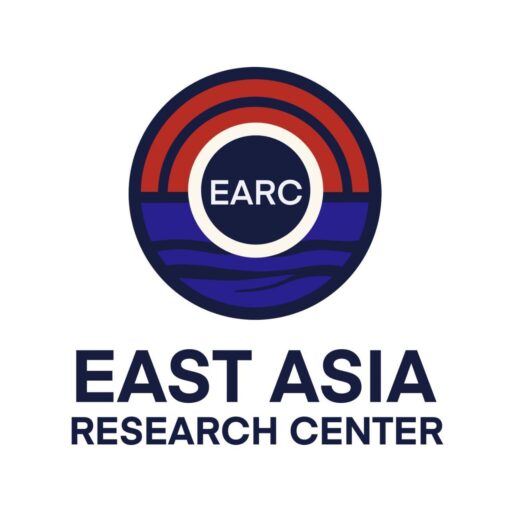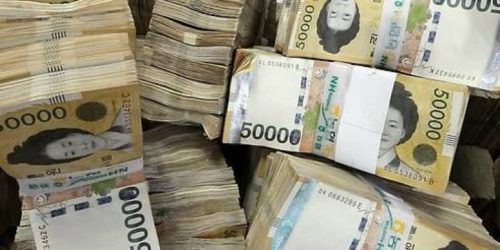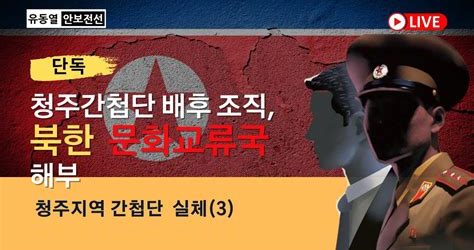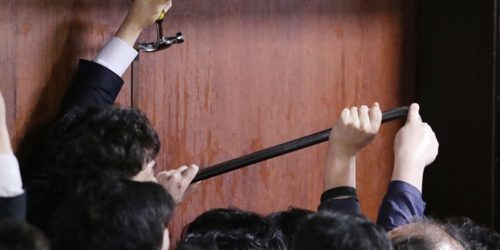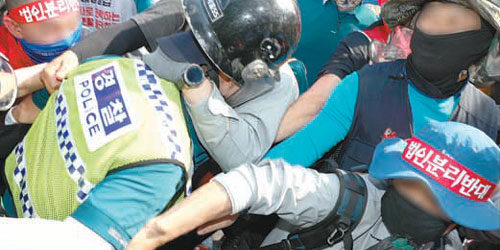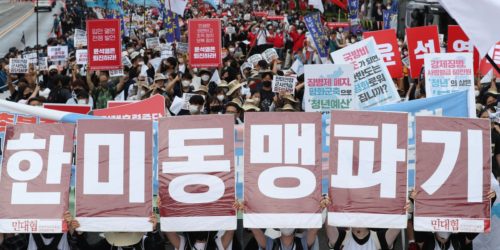People’s Front for Independent Unification, HGH, North Korea’s Extensive Spy Network Discovered All Over South Korea
2023-2-4, Tara O
A major spy scandal has been brewing for more than 5 years in South Korea. The activities of North Korean agents and their South Korean assets are being disclosed at a rapid pace. So far, activities have been discovered in Jeju, Changwon, Jinju, Gimje, Jeonju, and Seoul. Afraid of upsetting the Kim Jong-un regime, the previous Moon Jae-in administration (May 10, 2017 to May 9, 2021) actively suppressed formal investigations of the vast network of underground organizations that took orders from the Cultural Exchange Bureau under the United Front Department in the Korean Workers’ Party based in Pyongyang. Now that the investigative authorities, such as the National Intelligence Service (NIS), are free to perform their assigned duties (although for the NIS, it is only until the end of the year, when its investigative authority is to be taken away per the law passed by the Democratic Party of Korea), investigation is picking up steam against an enormous spy network, perhaps the biggest in two decades, much bigger than the espionage cases of IlsimHoe (일심회, “one heart committee”) discovered in 2006 and WangjaeSan (왕재산) in 2011.
People’s Front for Independent Unification (Jaju Tongil Minjoong Jonwi, 자주통일 민중전위)
In various regions of the Republic of Korea, underground organizations directed by North Korea were uncovered. The authorities conducted search and seizures of suspects simultaneously in Jeju (제주), Changwon (창원), Jinju (진주), and Jeonju (전주) in October and November 2022. In Changwon, South Gyeongsang Province, which also extended to nearby Jinju, the underground organization discovered is called Jaju Tongil Minjoong Jonwi (자주통일 민중전위) (People’s Front for Independent Unification).
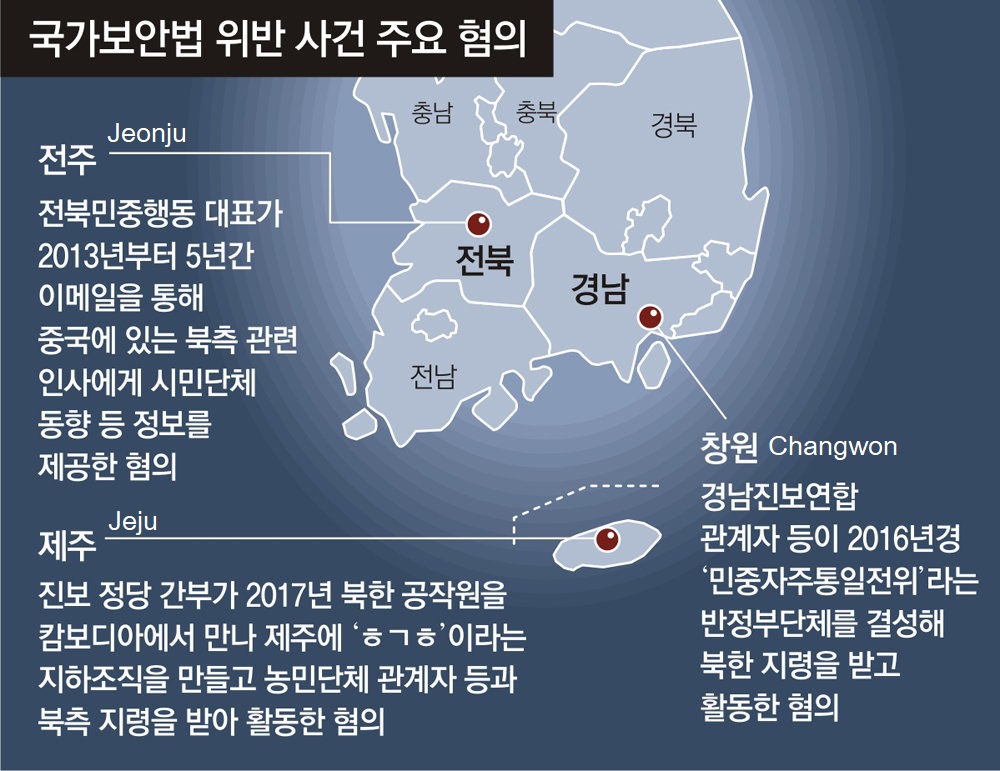
Since 2016, the suspected spies in the underground organization People’s Front for Independent Unification met with North Korean espionage agent Kim Myung-sung (김명성), an operative from the Cultural Exchange Bureau (Munhwa Goryuguk, 문화교류국), in Southeast Asian countries, including in Angkor Wat in Cambodia, and received orders to set up an underground organization(s). They then carried out North Korea’s instructions, creating the underground organization in the Changwon-Jinju area. The Changwon-Jinju area is where defense companies are concentrated.
The People’s Front for Independent Unification implemented the orders of the Cultural Exchange Bureau to expand the underground organizations’ field of activities by recruiting people and indoctrinating the younger generation through infiltrating mass organizations, such as the KCTU and the Korean Federation of Peasants (전국농민회총연맹).
North Korea also instructed the People’s Front to contact the chairman of the National Plant Construction Union (전국플랜트건설노조), which is under KCTU’s Korean Federation of Construction Industry Trade Unions (전국건설산업노동조합연맹). The chairman of the National Plant Construction Union was arrested in the past on suspicion of unlawful assembly, and another member of this union was charged with violating the National Security Law in November 2020 and is on trial. The latter reportedly engaged in pro-North Korean activities with Pastor Kim, who was sentenced to three years in prison for receiving orders from North Korean agents Yun Dong-chul (윤동철) and Ri Kwang-jin, who served as the directors of North Korea’s Cultural Exchange Bureau.
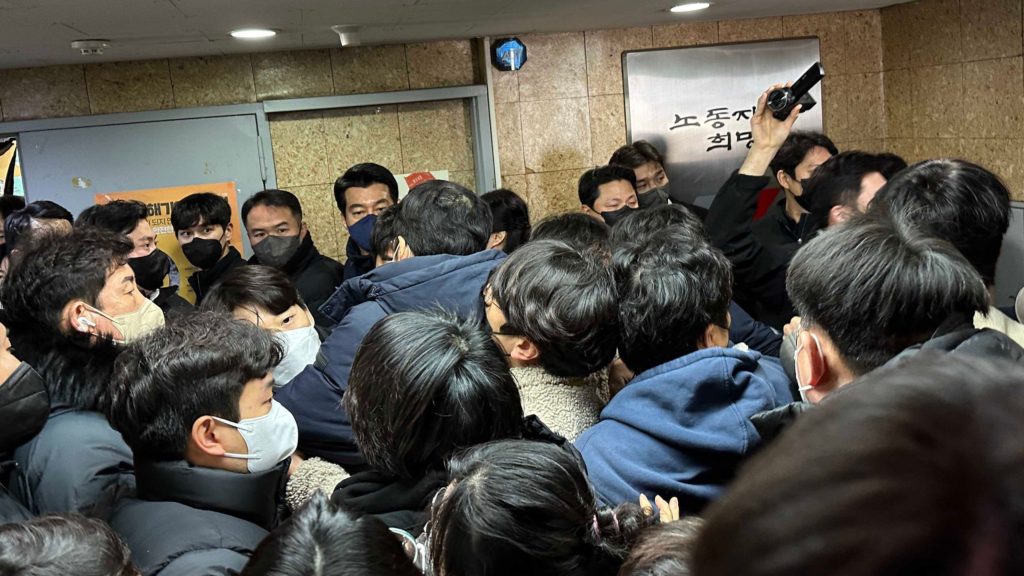
The People’s Front for Independent Unification, based in the Changwon-Jinju area, seems to have extended its operations to Seoul. On January 18, 2023, the NIS and the police simultaneously searched at least 10 locations, including the headquarters of the Korean Confederation of Trade Unions (KCTU) (Minju Nochong) in the Jeongdong neighborhood of Seoul, the office of the National Health Care Industry Workers’ Union (전국보건의료산업노동조합) under KCTU in the Dangsan-dong neighborhood in Seoul, and the office of the Peace Shelter of the Sewol Ferry Jeju Memorial Hall (제주기억관 평화쉼터) on Jeju Island, to seize relevant materials.
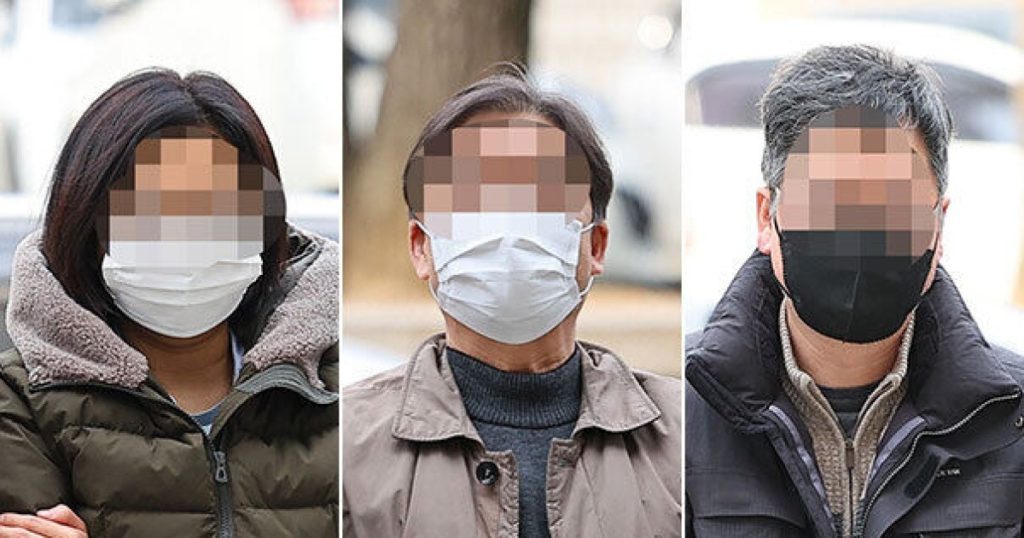
On January 28, 2023, the National Intelligence Service and the police arrested four people, including Mr. A, the chairman of the organizing committee of the Gyongnam Jinbo Yonhap (경남진보연합) (South Gyongsang Province Progressive Alliance), who was suspected of violating the National Security Act.
HGH
Similarly, the underground organization “HGH” (ㅎㄱㅎ) (presumed to be HanGilHoe or One Way Committee) in Jeju Province was created after North Korean agent Kim Myung-sung met with another spy suspect Mr. Kang since 2017 in Cambodia. (1:47) It was revealed that while Kang was in Cambodia, he stayed at the same residence in Siem Riep as the residents of North Korean agents—Kim Myung-sung and 4 other agents stayed for 2 nights and 3 days, pledging loyalty to the Kim regime, becoming Workers’ Party members with a ceremony, and receiving spy training. The duration of 2 nights and 3 days was relatively short, because in the past, the similar process occurred in North Korea, rather than a third country, and it took longer due to the complexity of the decryption method, among other reasons.
Kang is a former chairman of the Jeju Island branch of the Progressive Party (진보당의 제주도당), which was formerly the United Progressive Party, which was outlawed by the Constitutional Court. Its leader Lee Suk-ki went to prison more than once for violating the National Security Law, inciting insurrection, and embezzlement. Lee Suk-ki was released early from prison by Rho Moo-hyun in 2003 and then again by Moon Jae-in in 2021.
Kang recruited two people—a Jeju labor official and a “peasants’ activist” (농민운동) to organize HGH. In October 2021, North Korea ordered HGH to conduct activities calling for suspending ROK-U.S. combined military exercises, dismantling ROK-US-Japan military cooperation, and opposing the import of advanced weapons (F-35) from the U.S. by mobilizing groups, such as the Progressive Party’s Jeju branch (진보당 제주도당), KCTU Jeju Branch’s April 3 Unification Committee (4·3통일위원회), and the Jeju Branch of the National Federation of Peasants (전국농민회 제주도연맹).
The Cultural Exchange Bureau agent instructed spy suspects to form underground organizations in Changwon, South Gyeongsang, and Jeonju, North Jeolla Province, wage an anti-government struggle in solidarity with “progressive candlelight forces,” and propagandize the Juche ideology and the greatness of North Korea’s “State Affairs Chairman Kim Jong Un.”
After their establishment, these underground organizations were operating under Kim Myung-sung’s orders of “struggle against the U.S.” “infiltrate and seize power in the Korean Confederation of Trade Unions (KCTU) and expand their power” and “denounce Yoon Suk-yeol,” among others. The Cultural Exchange Bureau ordered HGH “to launch a series of mass struggles, such as protest rallies, protest visits, and signature drives with slogans such as the suspension of joint military exercises, the dissolution of the ROK -U.S.-Japan military alliance, and opposition to the introduction of high-tech weapons from the United States by mobilizing the JJ-do (Jeju-do) branch of the Progressive Party, JJ (Jeju) headquarters of the April 3 Unification Committee of the KCTU, the JJ-do branch of the National Federation of Peasants (전국농민회총연맹), and JJ region anti-war peace advocacy groups.”
In late 2022, the authorities conducted a search and seizure of HGH in Jeju Province.
The search and seizures also occurred concurrently in Gimje and Jeonju in North Jeolla Province, but the underground organization name is not yet revealed. It is suspected that these underground organizations are networked, with the People’s Front for Independent Unification in Changwon as the main headquarters. (1:42) They are all under the control of the Cultural Exchange Bureau (formerly 225th Bureau).
Ri Kwang-jin, the Director of the Cultural Exchange Bureau
While the People’s Front for Independent Unification in Changwon and the HGH in Jeju report to the Cultural Exchange Bureau through Kim Myung Sung, other spy suspects report through other North Korean agents, including Ri Kwang-jin /Ri Gwang-jin (리광진).
According to a senior defector, Ri Kwang-jin of the Cultural Exchange Bureau is a veteran operative equivalent to South Korea’s deputy minister and has a large number of operatives under his command, including Bae Sung-ryong (배성룡), Kim Il-jin (김일진), and Chun Ji-sun (전지선). Ri Kwang-jin’s name on the passport is Kim Dong-jin (김동진).
Ri is a graduate of the Kim Jong-il Univerisity of Politics and Military (김정일 정치군사 대학), where North Korea trains agents and armed special operators for anti-ROK operations. The “students” of the Kim Jong-il University do not use their real names, so it is unclear if Ri Kwang-jin is even his real name, but that is one of his names. In the 1990s, Ri infiltrated South Korea several times, disguising himself as the husband of a married couple.
Ri Kwang-jin is also believed to be behind the “Chungju Spy Ring” (Chungbuk Comrades Association for Independent Unification), which since 2017, has been campaigning against the ROK Air Force purchasing the F-35 stealth fighters, among other campaigns, at the behest of North Korea.
According to Dr. Yoo Dong-ryul (유동열), the Director of Korea Institute of Liberal Democracy, although the Cultural Exchange Bureau (and its predecessor 225th Bureau) is under the United Front Department of the Workers’ Party, it actually receives orders directly from, and reports directly to Kim Jong-un, not through the head of the United Front Department or the Prime Minister. This is an important point, because it means Ri Kwang-jin’s orders to his South Korean recruits came directly from Kim Jong-un, and that Kim has a keen interest in organizing these underground organizations and their agitation and propaganda activities in South Korea.
Labor Union: Korean Confederation of Trade Unions (KCTU) Infiltration Spy Ring
The Korean Confederation of Trade Unions (KCTU) (전국민주노동조합총연맹 abbreviated as 민노총) is an umbrella organization of other labor unions. It is the largest labor entity, with over 1.25 million paying members. (3:03) It often conducts demonstrations and activities that are beyond labor issues, to include demanding the withdrawal of U.S. forces from Korea, demanding abolishing the National Security Act, and partaking in candlelight demonstrations, which were performed to oppose the beef imports from the U.S., citing Mad Cow disease that never materialized in imported U.S. beef, and impeaching President Park Geun-hye.
Former and current officials of the KCTU met with North Korean agents several times abroad and returned to South Korea to implement orders to establish “underground organizations.”
On January 18, 2023, South Korean authorities conducted search and seizure of 10 locations related to KCTU. KCTU members blocked entry, screamed, and fought against the authorities, delaying the search and seizure. KCTU even posted videos of it, trying to gain sympathy by accusing the government of suppression, but the NIS and the police have proof of these KCTU officials meeting with North Korean agents multiple times in third countries, and establishing anti-state underground organizations per instructions from North Korea, specifically through the Cultural Exchange Bureau of the Workers’ Party’s United Front Department.
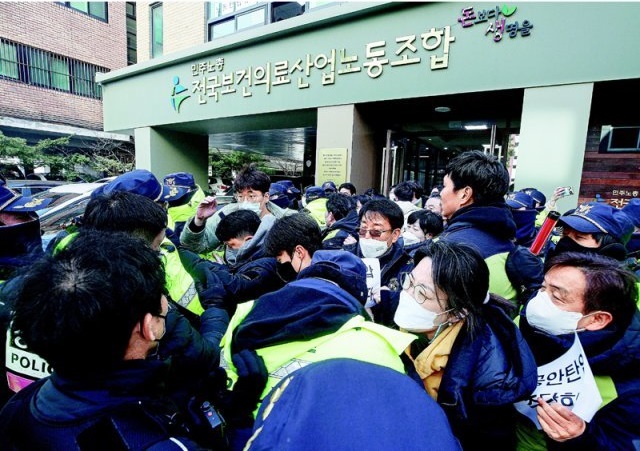
The History of KCTU Resisting Search & Seizure
Huh Hyun-jun (허현준), former Blue House official in the Park Geun-hye administration, explained that the KCTU has consistently resisted the authorities’ search and seizure efforts in the past, sometimes with metal pipes, and that the attempts to conduct search and seizure are not always successful. (14:40)
- In 1997 during the Kim Yong-sam administration, the police tried to conduct a search and seizure, but were not successful due to intense resistance from the KCTU.
- In 2001 during the Kim Dae-jung administration, the police tried to conduct search and seizure related to strikes at Daewoo, but was not successful due to the intense resistance from the KCTU.
- In 2003 during the Rho Moo-hyun administration, the police tried to conduct a search and seizure, but was not successful due to the intense resistance from the KCTU. KCTU members surrounded the building and fought the police with metal pipes.
- During the Park Geun-hye administration, two search and seizures and arrest attempts were made. In 2013, the KCTU members wielding metal pipes fought with the police and blocked their access, but the police eventually prevailed and entered the building and the office. They could not, however, execute the arrest warrant for Kim Myung-hwan (he later became the KCTU’s Central Committee member in 2020-2021), because he ran away while the KCTU members skirmished with the police.
- 2015, still under the Park Geun-hye administration, the authorities successfully conducted a search and seizure of 8 locations, including the KCTU headquarters and other labor union member organizations.
- During the Moon Jae-in administration, there was no attempt at search & seizures of the KCTU, despite its numerous violent activities.
- In January 2023, during the Yoon Suk-yeol administration, the authorities successfully conducted multiple search and seizures, despite KCTU resistance.
Spy Suspects in Korean Confederation of Trade Unions (KCTU) (Minju Nochong)
The National Intelligence Service and the police are investigating four people for violating the National Security Act. (They have not been arrested yet.) The four suspects include Suk Kwon-ho (석권호), the Director of Organization at the KCTU, Mr. F, the former vice chairman of the Korean Metal Workers’ Union (전국금속노동조합), Mr. G, the head of the Korean Health & Medical Workers Union (전국보건의료산업노동조합), and Mr. H, the CEO of the Sewol Ferry Jeju Memorial Hall Peace Shelter (세월호 제주기억관 평화쉼터), and former member of the Korean Metal Workers’ Union. They met with North Korean agent(s) as follows:
- Mr. Suk in Phnom Penh, Cambodia in 2017 and in Hanoi, Vietnam in 2019
- Mr. F in Phnom Penh in 2017
- Mr. G in Phnom Penh in 2017
- Mr. H in Hanoi in 2019
They traveled individually or in a team of two people to the Southeast Asian countries. All four have criminal records, including violence and obstruction of official duties.
They met with North Korean operatives in third countries and were tasked with infiltrating various civic organizations and taking control of those organizations. To accomplish the tasks, they received training on how to organize anti-government groups and how to communicate with North Korea, and then returned to Korea to continue their anti-government activities in accordance with the programs and protocols dictated by the operatives.
Suk appears to be the primary organizer who recruited others for spying activities. This also means that Suk pledged loyalty to Kim Jong-un, joined the communist party (Korean Workers’ Party), and received espionage training. In August 2016, Suk traveled to Beijing with a “Boston Bag.” It appeared that the Boston Bag was transferred to the North Korean agent, as he left for North Korea holding a similar bag. In September 2016, Suk travelled to Hanoi and received a “dark item” from a North Korean agent. Upon his return to Korea, Suk exchanged $10,000, probably an espionage operations fund, at a currency exchange in Namdaemun Market.
After meeting the North Korean agent(s), Mr. E also contacted Mr. J, the Chief of the National Federation of Democratic General Trade Unions (전국민주일반노조연맹) / Democratic General League (민주일반연맹) under the KCTU.
Suk, who is KCTU’s Director of Organization, was KCTU’s Director of the Politburo (정치국장) and Director of the Office of Organizational Disputes (조직쟁의실장) when he went to Phnom Penh in 2017.
All four of them have participated in activities demanding the withdrawal of the U.S. forces from Korea, abolishing the National Security Law, and criticizing the Yoon Suk-yeol government, and the authorities see that those activities are on orders from North Korea.
They secretly reported the status of the implementation of orders to the Cultural Exchange Bureau by converting texts in the reports to numbers, and hiding the numbers using steganography in “cover files” before sending it to North Korean agents. The North Korean agents and their recruits also shared the same emails and passwords, and the agents would leave instructions in cyberspace, and their recruits would check the same email for the messages left, and vice versa—a Cyber Dvock method—to avoid the risk of detection.
The Director of Organization Department at the KCTU communicated with other spy suspects who are members of the Chungbuk Comrades Association, which was formed at the direction of North Korean agents of the Cultural Exchange Bureau. The members of the Chungbuk Comrades Association were arrested in 2021. Three of them were released from jail, two of them through bail, which the judges accepted. The judge rejected arresting the fourth member of the Chungbuk Comrades Association. After the release of the three, at least one member communicated with KCTU’s Director of Organization by phone on June 7, 2022, probably to provide updates about the investigation and court hearing status to North Korea. They communicated again 6 months later on December 9, 2022.
During October-November 2022, KCTU’s Director of Organization Department also communicated with Pastor A nine times by phone call and text message. Pastor A is on trial (without detention) for receiving operational funds from North Korea. Pastor A met with Ri Kwang-jin and received a payment of U.S. $18,900. Pastor A, along with Pastor Kim, met and communicated with North Korean agents, and then praised the North Korean regime and spread propaganda in support of the regime. Pastor Kim was indicted in December 2015 for other violations of the National Security Law and in 2017, he received a 3-year prison sentence. North Korea’s spies have infiltrated not only the KCTU and various member labor unions and civic organizations, but also religious organizations.
Not detaining the spy suspects in jail allows them to freely contact each other and still carry out North Korea’s orders, including their status reporting. They also seem to have become bold due to the Moon Jae-in administration’s suppression of investigations of espionage and subversion suspects. The suppression of investigations involved senior level officials in the Moon government. (See here for the suppression of investigations under Moon.)
In communicating with these spy suspects, the authorities believe that the KCTU’s Director of Organization was ordered to assess the underground spy network situation.
In the 2000s, as a member of the “1st Unification Front of Anti-U.S. and Anti-War National Cooperation in the Gyeonggi Province Region,” Suk demanded the abolition of the National Security Law and the withdrawal of the U.S. forces from Korea. In 2017, he also participated in the movement to release Lee Suk-ki. In October 2022, he presided over the “Declaration of Struggle for a General Strike of Irregular Workers in the Public Sector” held in front of the President’s office in Yongsan.
Unification Front for Independent Unification
During August 6-13, 2022, KCTU’s Unification Committee (통일위원회) organized the Tong-il SunBongDae (통일선봉대) (Unification Vanguard) and toured around Korea, demonstrating and demanding the halt of the ROK-U.S. combined military exercises, the dissolution of the alliance, and the withdrawal of U.S. forces from Korea. The tour ended in a large-scale anti-U.S. rally in Seoul. Clearly, the demonstration’s theme was far removed from labor issues. On August 11, 2022, KCTU’s Unification Committee proudly posted on its website a letter and “8.15 Solidarity Statement of the National Workers’ Congress” from North Korea’s labor organizations: the Central Committee of the General Federation of Korean Occupations (조선직업총동맹 중앙위원회), the National Confederation of Democratic Trade Unions (전국민주로총조합총련맹), and the Korean Federation of Korean Labor Unions (한국로총조합총련맹). The letter highlights the three key points of the resolution: “No ROK-U.S. Joint Military Exercises! No Korea-U.S.-Japan Military Cooperation! and Minjok’s Independence, Peace, and Great Unity”—the same themes repeated at KCTU demonstrations, including the ones in August 2022.
Political Party Infiltration
The authorities also have evidence that Cho Jong-hoon (조정훈), former aide to the National Assemblywoman Yun Mee-hyang’s (윤미향), made contacts with a North Korean agent in Vietnam in 2016. (Note: Cho, the aide, is not the same person as current National Assemblyman Cho Jong-hoon). Additionally, between 2020-22, Cho sent reports ciphered with bookcodes to North Korea. Yoon and Cho were colleagues who worked in the same private organization, Kim Bok-dong’s Hope (김복동의희망), even before entering the National Assembly. Yoon Mee-hyang was mired in a controversy of embezzling funds from an organization (the Korean Council for Justice and Remembrance, 정의기억연대) that raised funds on behalf of comfort women. In May 2020, Yoon Mee-hyang was accused by Lee Yong-soo, who alleged that Yoon had exploited her and other comfort women for decades. Democratic Party of Korea appointed Yoon as a proportional representative (non-elected lawmaker) and she began her term. Yoon left the party after the indictment, but she maintained her position as a lawmaker. A few weeks into the investigation, a key witness, the head of the shelter run by the Korean Council for Justice and Remembrance, was found dead in his apartment.
“Brother-Sister Spy Ring” (남매간첩단) Exposed in 1993
Yoon Mee-hyang’s husband, Kim Sam-suk (김삼석), is yet another person who is controversial. In 1993, Kim Sam-suk and his sister Kim Eun-joo (김은주) were charged violating the National Security Act in a spy case called “Brother-Sister Spy Ring” (남매간첩단). In January 1992, they met with an agent of an anti-state group Jaeil Hanguk Minju Tongil Yonhap (재일한국민주통일연합) in Japan, received orders to conduct anti-nuclear weapons activities in South Korea, received operational funds, and formed a Coalition for the Anti-Nuclear Peace Movement (반핵평화운동연합) upon their return to South Korea. The last U.S. tactical nuclear weapons were withdrawn from South Korea in 1991, after which the U.S. provided “nuclear umbrella” to the Republic of Korea. Thus, Kim’s group conducted activities to oppose the U.S. providing extended deterrence to South Korea. The brother-sister team communicated with the agent and leaked South Korean military secrets. Kim Sam-suk received a 4-year sentence and was released from jail in 1997.
The Chungbuk Comrades Association for Independent Unification (The Chungbuk Spy Ring)
In September 2021, North Korea’s “Chungju Spy Ring” (청주간첩단) was exposed when the authorities arrested 3 of 4 people who met with North Korean agents in third countries and formed an underground branch of the Workers’ Party after receiving orders. The underground organization was called Jaju Tongil Chungbuk Dongjihoi (자주통일 충북동지회) (Chungbuk Comrades Association for Independent Unification), and this case is referred to as the Chungbuk Spy Ring for short.
All three were released, two on bail. The fourth was never arrested, despite the prosecutors’ request to the judges. After the release, at least one member of the Chungbuk Comrade Association communicated with the Director of the KCTU’s Organization Department, who also met with the North Korean agents and formed yet more underground organizations designed to subvert South Korea, as explained earlier. They communicated with each other by phone on June 7, 2022. They communicated again 6 months later on December 9, 2022.
Conclusion
What has been uncovered thus far is considered only the tip of the iceberg. North Korea having extensive spy network(s) in South Korea fits with the Kim regime’s long stated goal of taking control of the entire Korean peninsula under its rule. Many often forget North Korea’s goals and its subversive methods, simply because South Korea has developed rapidly and became wealthy, while North Korea is poor. The complacency and naivete reached a point that one of the fashionable sayings during the 2017 presidential campaign was “how can there still be spies these days?”
It turns out the spies for North Korea and their activities have been rampant in the Republic of Korea. It is important to keep in mind that the NIS’s authority to investigate spy cases is scheduled to be taken away at the end of the year, per the law passed by the Democratic Party of Korea and signed by Moon Jae-in. With a 3/5 majority, Moon’s party had enough seats to exclude all other parties, and still pass any law it wanted (except to change the constitution, which takes a 2/3 majority). How much of North Korea’s espionage activities are revealed depends on the capability of the government organizations to carry out their tasks, including the courts. It also depends on the will of the current administration and its ability to reverse the damage to, and bolster, the NIS and other relevant agencies.
